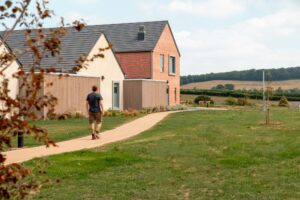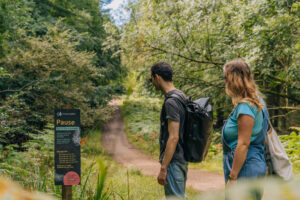In June 2024, at the Design in Mental Health Network conference in Manchester, a workshop led by Jo Baudin, Nick Smith and Richard Barton, members of our Lived Experience Advisory Panel delved into what it takes to build real co-production in mental health environments. Joined by board members Katharine Lazenbury (ELFT NHS Trust Expert by Experience lead), Cath Lake (P+HS Architects), and associate William Wang (architect and co-production specialist), the session explored how to create meaningful collaboration that values each person’s voice and experience.
Since the workshop, we’ve refined these principles based on delegate feedback, and what follows is the final iteration of our collective work. We hope these insights help shape more inclusive co-production, recognizing the need to address structural inequalities and promote equity, diversity, and inclusion (EDI) throughout the process.
Here are the principles we found.
—
1. Setting Up for Success: Building a Foundation of Equity and Diversity
The first step to genuine co-production is recognizing that people’s perspectives vary widely, shaped by unique experiences. A foundation rooted in equity and diversity means making space for everyone’s story and involving people from all backgrounds right from the start. When setting up a project:
- Establish a Balance of Power: Invite people with lived experience into decision-making from the outset, not as an afterthought, and be upfront about objectives and expectations.
- Consent and Transparency: Record people’s input, provide feedback loops for them to review their contributions, and ensure their voices remain authentically represented.
2. Conducting Inclusive Workshops
Effective workshops need clear communication, adaptability, and a commitment to equity, which recognizes that each participant may need different levels of support to engage fully. This flexibility helps foster trust and creates an environment where all contributions feel valued.
- Budget for Recovery and Support: Make sure the project budget acknowledges the importance of lived experience, covering participant support and fair compensation. Involving participants in these conversations validates their contributions and strengthens their sense of agency.
- Breaking Down Biases: Remember that people with lived experience may communicate differently or feel less confident in traditional settings. Workshops should be safe spaces where everyone feels comfortable expressing ideas without needing to “perform” them.
3. Facilitation and Creating Welcoming Spaces
A strong facilitator, ideally someone with lived experience, is invaluable for ensuring everyone is heard and respected. Creating a comfortable, inclusive environment—physically and emotionally—sets the tone for authentic engagement.
- Space and Accessibility: Opt for welcoming spaces with natural light, healthy snacks, breaks, and comfortable seating. Outdoor settings, like parks, can be inspiring alternatives that help to create openness and reduce formality.
- Easing Into Roles and Language: Start each session by breaking down traditional roles and use inclusive language. Making space for all kinds of experiences—professional, personal, and community-driven—enhances the collaborative spirit.
4. Follow-Up: Gratitude, Accountability, and Progress
Co-production doesn’t stop when a workshop ends. True partnership means honoring contributions by following up, offering feedback opportunities, and transparently communicating progress.
- Share the Final Takeaways: After each session, summarize the findings and send them back to participants in their own words, with a chance to add feedback.
- Stay Transparent and Responsive: Acknowledge what actions will move forward and explain any that won’t, keeping the dialogue open and respectful.
Building Our Co-Production Practice
The collective effort from this workshop—now refined through participant feedback—helps pave the way for more inclusive, respectful co-production. These principles encourage everyone to bring their full selves to the table, with respect for structural inequalities and the need for EDI woven into each step. As we continue to grow and learn, we hope these insights will deepen our understanding and enhance our approach to creating spaces that reflect the voices of those they’re built for.





